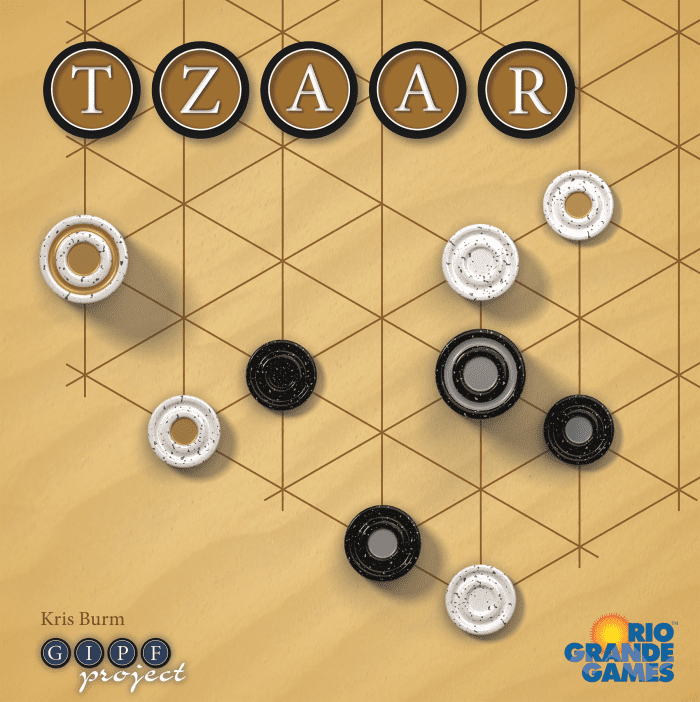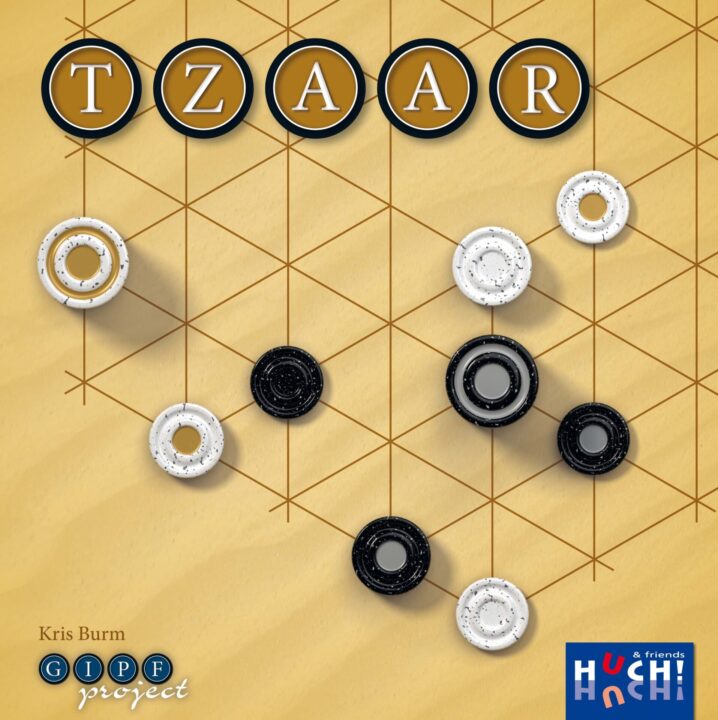Overview
Welcome to this chess-like arena where the abstract clash of minds melds into an invitation of strategic conquest. This review will delve into the captivating board game of TZAAR, highlighting the intellectual ballet that takes center stage with each move and countermove. Critically acclaimed for its dynamic play, TZAAR demands vigilance and strategic foresight, promising an engaging battle of wits at every turn. So, sharpen your tactics and brace yourself for an insightful exploration into this illustrious game of strategy and intellect.
How It Plays
TZAAR is a deeply strategic abstract game with simple core mechanics. Yet, beneath is a vast landscape of intricate decisions waiting for players to navigate. As experienced during my engaging sessions for this TZAAR Review, the gameplay can often evolve dramatically, providing an element of surprise every time you play.
Setting Up
To set up, players arrange the TZAAR pieces, each receiving an identical mix of three different types. The formation spells the importance of diversity in your piece selection—crucial for dominance.
Gameplay
Players take turns moving their pieces across the interlocking spaces, either stacking their forces strategically or leaping into capture. It’s a delicate dance between aggression and fortification where each move silently converses with your opponent’s plan.
Winning the Game
The endgame zeroes in on dual focus—removing all one type of the opponent’s pieces or rendering them unable to perform a legal capture. It’s not just about having the last piece standing but outmaneuvering, sacrificing, and persisting aptly amidst the game’s tactical ravine.
Want to know more? Read our extensive strategy guide for TZAAR.
Peeling the Onion of Strategy
In my play sessions, the strategic depth of any board game is a delightful puzzle, the core that prompts late-night, coffee-fueled debates. This holds true for TZAAR, a game teetering on the brink of simple design and revelatory tactics. Its minimalist approach is deceptive; beneath lies a web of complex choices that evolve with each play.
Subtle Beginnings, Infinite Possibilities
Those early, seemingly innocuous moves in TZAAR are anything but. Transitioning quickly from easy decisions to profound strategy, the game impressed me with how the first rounds set the tempo for the impending mental marathon.
A Dance of Cognitive Weights
As play progresses, the layers unpeel. Every decision feels weighty, a dance between securing one’s own pieces and laying traps for your opponent. It’s games like these that showcase how depth doesn’t equate complexity but thoughtful sophistication. But with strategic depth charted, the joyous tension in TZAAR certainly emanates from the ballet of piece capture and sacrifice.

The Duel of Decisions: Capture and Sacrifice
In my TZAAR reviews, the tension brewed from understanding the delicate dance of piece capture is always a highlight. Each move, deeply rooted in strategy and foresight, can shift the tide in a matter of turns. Reflecting on countless games, the thrill when capturing an opponent’s Tzaar is palpable, yet so is the sting when a Tzarra sacrifice is a misstep, setting up my downfall. Always present is a narrative of calculated gambits and poignant losses, a captivating ebb and flow that only TZAAR can manifest.
The Art of Letting Go
Interestingly, sacrifice in TZAAR doesn’t always equate to a weakened stance—one must trust in the paradoxical strength found in choosing which piece to forfeit. Just last week, sacrificing a stack for positional supremacy won me the game, hinting at the rich layers of complexity available in this seemingly simple action. Like the pieces themselves, every session writes a new chapter in my board gaming saga.
Advancing further into the narrative, our attention now turns to where these sacrifices translate most tangibly – the arena of player interaction and the brilliant tension it exerts.
Thrills of Conflict in TZAAR
During my spirited playthroughs for this TZAAR Review, Pulse-Racing Moments were common as we dueled across the abstract expanse. Initially, the game’s serene appearance belied its riveting essence. Yet, sooner than anticipated, tenacious rivalries were illuminated by the strategic confrontations TZAAR engenders. There was a palpable tension, aggregating with each move we etched into its history.
Rivalry-Fueled Friendships
The anarchy of anticipating opponents’ tactics lent a zesty twist. Victory conceits aside, TZAAR propelled us into heady peaks of convivial competition, accentuating connections amidst the cognitive clash—the epitome of a social stratagem. Ultimately, the dance of minds TZAAR entails comes utterly recommended; it’s not just a game – it’s a forge for camaraderie.
Conclusion
Concluding this TZAAR review, the game stands out as an exemplar of strategic brilliance. Its spellbinding dance between complex strategy and the imperative of piece capture creates an epic narrative in each session. TZAAR triumphs in igniting a social spark, joyously chaining players into a silent promise of rematch after rematch. Amidst the toils of stability and triumph, it is more than a game; it’s intellectual artistry laid bare on the board. And so, to those who revel in strategic depth and the beautiful tension of human interaction, I heaping recommend TZAAR.


